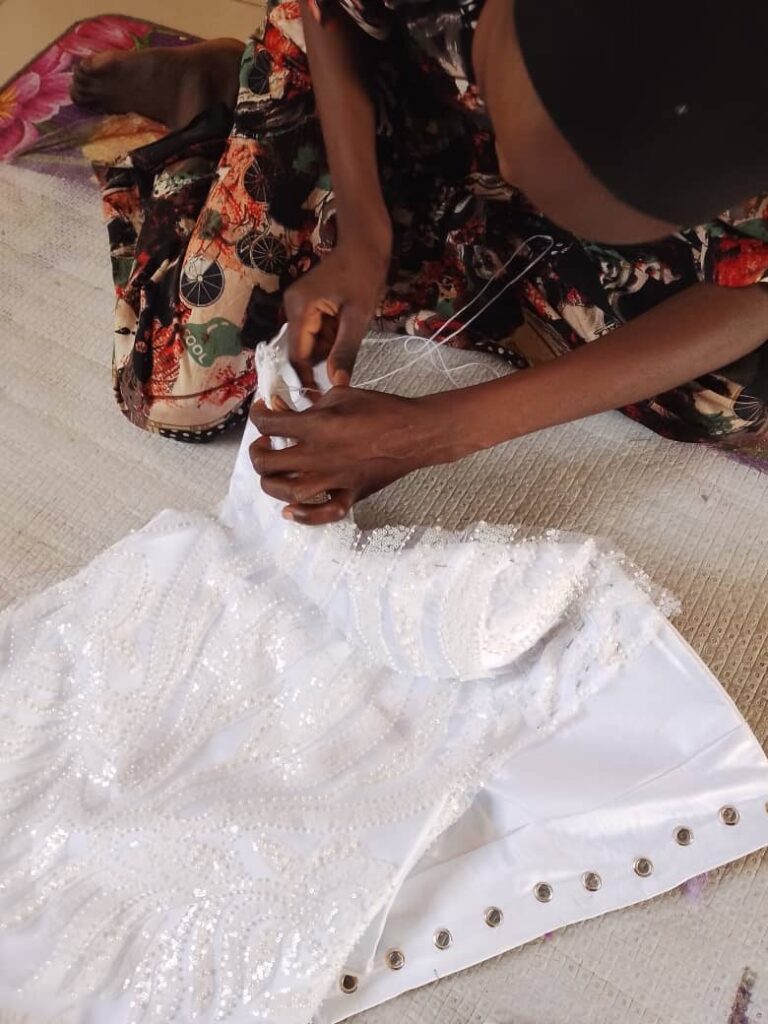“You will grow, you will learn, and you will be better than this.”
These are the words Nao would choose to share with her younger self, before she joined our interim reparative measures project in Nigeria’s northern Adamawa state.
Nao was just 18 when Boko Haram militants overran her village in the summer of 2014. The sexual violence she suffered halted her plans of becoming a teacher – a goal that had become even closer following her admission to college that year. Instead, she spent years grappling with the consequences of the abuse she suffered.
In the ten years since, her life has changed in many ways. She has qualified as a teacher, and got married in May – both unimaginable events in the aftermath of the attack. Speaking with GSF, she explains the skills she learned through our project, how it led to a new lease of confidence and inspiration for her wedding day – and opened the door to a new career.
“I was skeptical at first,” she said of joining the project, carried out in partnership with the Youth Initiative Against Terrorism (YIAT) in three towns across the state. She had joined other programmes before, with mixed results. With YIAT, however, she felt comfortable coming forward as a survivor. “They kept encouraging us, but there was no pressure. We had psychological support too, so I continued.”
It was here, through vocational training, that she could pursue her love for sewing and tailoring – a hobby she had previously put on hold to study and eventually provide for her family. With support from YIAT, she chose to resume what had once brought her so much joy.
Since starting the project, I have been able to sleep better. I don’t overthink as much anymore.
— Nao, Survivor
When Nao told her vocational trainer she was getting married, her teacher suggested making her own dress with the skills she had refined. At first, she laughed off the idea. But renting a wedding dress was beyond her means – and living in a rural area limited her options.
She started looking up styles and ideas online, sketching out designs while her trainer helped her through each step. Together, they picked out all the materials she would need and got to work. She made the inner layer, did a few fittings, and hand-stitched the lace for the final touches.
I’m so excited. Honestly, I had given up, I didn’t think my life would ever change. You’ve brought smiles to our faces and truly changed our lives.
— Nao, Survivor
Nao says the process was stressful, but this is not the first time she has faced a challenge. When her college reopened two years following the Boko Haram attack, she was too scared to resume her education. The thought of being in a classroom was triggering and brought back painful memories of what she had suffered. It was after interventions from family and school friends, which gave her emotional support, that she decided to return. She completed her studies in 2016, but found it difficult to sustain a family and work full time work as a teacher.
Instead, she chose to follow what brought her pride – a feeling often hard to cultivate for survivors in the face of so much trauma.


Survivor making her wedding dress with support of her vocational trainer. Nigeria, March 2025. Ussah – GSFUssah Yakubu/GSF

On her wedding day Nao says she “looked beautiful, and felt so happy. I was thrilled, and many people complimented me on the day.” Her designs have proven so popular that she is now taking orders for bridesmaids and flower girl dresses, and expands to grow her business and partner with a menswear specialist. She plans to rent out her wedding dress, and make other women feel as beautiful as she did for her marriage.
Nao’s story is her own personal journey, but also symbolises many obstacles survivors face following conflict-related sexual violence, from financial difficulties to trauma and ostracisation. From the aftermath of the attack to her recent marriage and business growth, she reflects on how the project has helped changed her situation, and made her community more accepting. In her own words: “Before, all we heard were insults and people saying that (survivors) had ruined their community. Today, I’m deeply grateful for this project.”